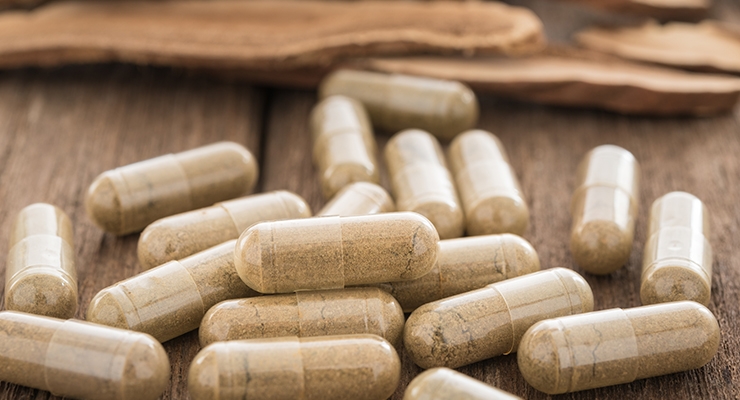Market Updates
Herbal Supplements Post Strongest Sales Growth in Two Decades
CBD, botanicals for immunity, mushrooms, goji berry, Ayurvedic herbs, and adaptogens among top-sellers.

By: Sean Moloughney

U.S. sales of herbal dietary supplements exceeded $8.84 billion in 2018, according to the American Botanical Council’s (ABC’s) 2018 Herb Market Report, representing a 9.4% increase from the previous year—the strongest sales growth for herbal supplements in two decades.
Data appears in issue 123 of ABC’s quarterly, peer-reviewed journal HerbalGram. ABC’s 2018 market report is based on U.S. retail sales data provided by SPINS, a wellness-focused data technology company based in Chicago, IL, and Nutrition Business Journal (NBJ), a publication of Informa/New Hope Natural Media based in Boulder, CO.
The sales estimates for individual herbs and fungi discussed in the report reflect sales of herbal dietary supplements in which that herb is the primary ingredient. The report does not include sales of most herbal teas, botanical ingredients used in cosmetics, or government-approved herbal drug ingredients in over-the-counter medicines.
The report was written by Tyler Smith, managing editor of HerbalGram; Claire Morton Reynolds, senior industry analyst at NBJ; and Michelle Gillespie, Veronica Eckl, and Jake Knepper, natural insights analyst, associate data product manager, and product library solutions manager, respectively, at SPINS.
NBJ based its total herbal supplement sales figures for 2018 on data from market research firms, company surveys, interviews with major retailers and industry experts, and other secondary materials. SPINS determined sales of herbal supplements in the mainstream grocery retail channel, which includes drug stores, military commissaries, select buyer’s clubs, and so-called “dollar stores,” and the natural grocery retail channel, which includes sales from co-ops, associations, independent retailers, and large regional chains with the exception of Whole Foods Market.
In mainstream retail outlets, herbal supplements with horehound (Marrubium vulgare) listed as the primary ingredient, including natural cough drops and lozenges, grossed the highest sales in 2018. Goji berry (Lycium spp.) supplements, many of which were marketed for weight loss, experienced the strongest sales growth in this channel, with a 637% increase from 2017. Sales of products containing cannabidiol (CBD), a psychoactive but non-intoxicating constituent of Cannabis sativa, made it the top-selling ingredient with the highest percent sales growth, 332.8%, in the 2018 natural channel.
The report also discussed consumer trends that may have played a role in driving sales of certain ingredients. Herbs and fungi marketed for immune health experienced some of the more robust sales growth in 2018, which may have been related to the unusually severe 2017-2018 flu season. In addition, Ayurvedic herbs, adaptogens, and ingredients with general health benefits continued to be top-sellers in both market channels.
“CBD and mushroom products dominated the 2018 herbal supplement scene, and sales growth remained strong for Ayurvedic herbs and adaptogens,” said Smith, who has co-authored the report since 2014. “There were also a few surprises in the data—sales of goji berry, for example, which had declined sharply in recent years, experienced a significant rebound in 2018. We hope the consumer trends and sales data discussed in the report will be of use and interest to a range of stakeholders, from natural products companies to health-conscious consumers, and others.”
“This report strongly supports the continually rising consumer preference for natural, plant-based dietary supplements that can have a positive impact on their health,” said Mark Blumenthal, ABC founder and executive director, and editor-in-chief of HerbalGram. “For over 20 years we have been publishing information on the steady growth of the market for herbal dietary supplements in the United States; the market sales results demonstrate the confidence that consumers appear to have in herbal dietary supplements.”
The report contains six tables of market data, including tables of the 40 top-selling herbs in both mainstream and natural retail outlets, with detailed descriptions of each market channel. It also includes a table and corresponding graph of NBJ’s estimates for total sales of herbal supplements from 2000 to 2018 and a table with sales broken down by product type (single-herb supplements vs. combination formulas) and NBJ-defined market channel (mass market, natural and health food, and direct sales).


